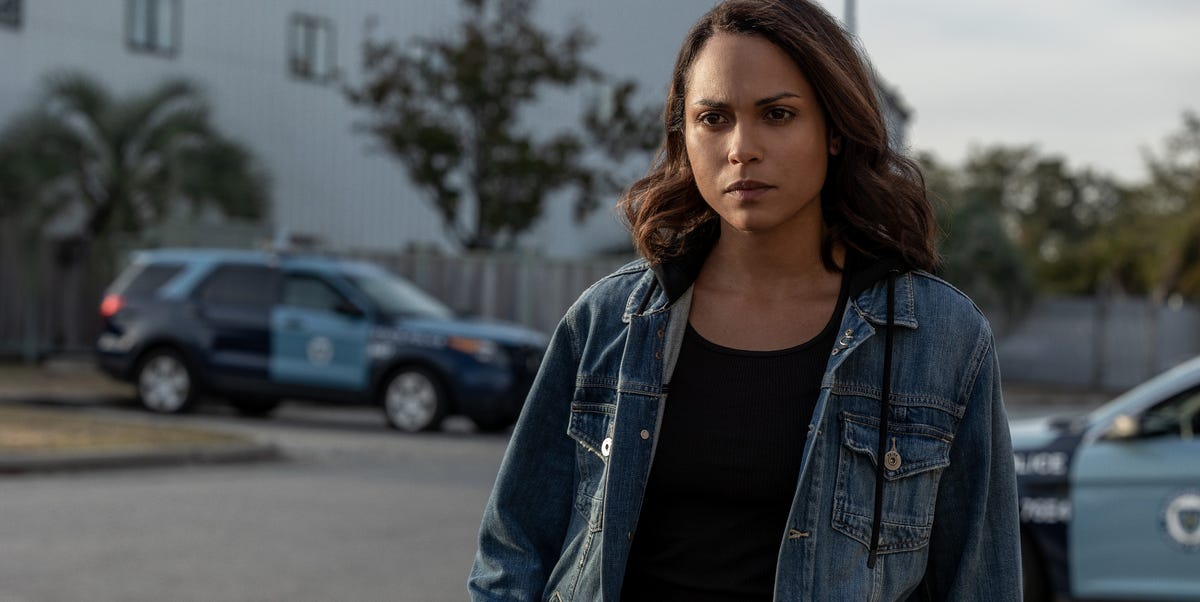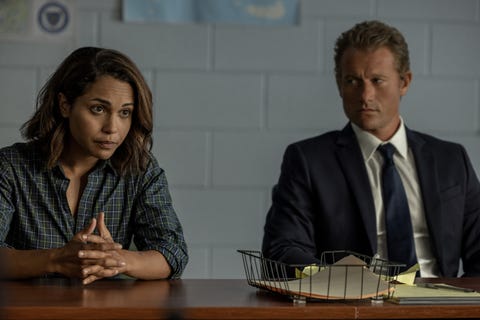Monica Raymund made a big leap when she left Chicago Fire after six seasons to sign onto a new series from a first-time showrunner. The gamble paid off. Hightown, a gritty crime drama set in Provincetown, set records for viewership for its network Starz. For Raymund, it gave her a chance to form a collaborative relationship with creator Rebecca Cutter and the rare opportunity to see some of herself in her character Jackie, a queer Latina woman trying to find her way—while also investigating a murder with deep ties to the Cape Cod underworld.
While Jackie spent much of season 1 dealing with self-destructive impulses that threatened her career in law enforcement, her relationships, and her fledgling sobriety, season 2 looks at the very real challenge of maintaining stability once it’s been achieved. Raymund spoke with ELLE.com about finding the humanity in all characters, working with a female team, and why Hightown isn’t like other crime shows.
A lot has happened to Jackie and she finds herself in a very different situation in season 2. How would you characterize her personal growth?
At the beginning of season 2 we find her sober, she’s got some time under her belt, she’s committed to trying to get her life together. I think she identifies her purpose and wants to become a good police officer, a good friend, wants to just do good. She’s coming from a place of real clarity at the top of season 2. That gives her somewhere to go for the rest of the season.
You mention sobriety. Something that I was wondering about was any response you’d heard from people dealing with sobriety or addiction, about how your depiction made them feel seen.
There’s a variety of characteristics of Jackie that I think that provide an opportunity for people to say that, to feel seen. Unfortunately, addiction is rampant and is ubiquitous. Most of us I would imagine either have dealt with it ourselves or know people or have friends or family or have lost people to the disease of addiction. To be able to be a part of telling that story and hopefully showing the truth of it. Not only how difficult it is, but what it means to go through the process of sobriety and showing that it’s very messy trying to get clean and stay clean and that there is no bias. There’s no bias with addiction. You can be from anywhere or be anyone; the grasp is still very tight. Hopefully it is being depicted truthfully. I know that Rebecca Cutter is such a brilliant writer and, for me, has set the backdrop very specifically.
There are a lot of new faces this season. Jackie has a new partner, Leslie (Tonya Glanz), and Luis Guzmán joined the show. What did that do to the on-set atmosphere?
Oh, it’s been fantastic! To have Luis Guzmán on our show is such a huge deal. It just feels like he’s so good and he’s such an icon that it just elevated all of us. We had to been on our game, we had to be connected because we have this legend on set with us. It was really, really cool and very humbling.
He loved the character and he loved the world of it. That’s such a testament to Rebecca Cutter and her writing very dynamic and interesting characters to make somebody like Luis Guzmán want to do this. It’s hard to get somebody like that! The fact that the words on the page were so captivating to get an actor of that stature, it just was a pleasure. I was so excited when we cast him.
It’s rare to see a police show with women partners at the front. What was that like to film?
It was amazing to be able to be a leading female police officer; she’s a liaison to the police department. These are two women who are in a man’s world but they know how to bust balls, they know how to hang with the guys. They also know how to be in public versus who they are in private. There’s a part of ourselves that we either hold back or we change whenever we want to impress or hide. We’re always shifting who we are in order to keep the status quo or to not rock the boat. That is very much true with Leslie and Jackie. Then they start hanging out and maybe some feelings start to arise and they start getting into some hot water. That territory becomes very murky. What happens when we mix business and pleasure?
How do you think what Hightown is doing is different from other police shows?
I think what Hightown is doing is really spending time with characters in a very intimate way. Yes, the show is very much about, for Jackie, the mission but you’re also spending time with Frankie (Amaury Nolasco) and with Renee (Riley Voelkel) and with these other characters who are on the other side of Jackie’s lens who Jackie’s trying to capture. You spend time with Ray (James Badge Dale), who kind of switched with Jackie from the first season. He’s dealing with very dark demons and his own issues. He’s literally living in a basement. He’s subterranean, physically and emotionally.
We’re just spending so much more time with the characters in a spiritual and emotional way that I don’t think you see a lot of. In these police dramas it’s so much about the chase. It’s always about the chase. And that’s true with Jackie. But who are they behind closed doors, what happens behind our bedroom doors? You never know the full story.
I think the show gives a lot of humanity to each of the characters. Regardless of which side of the law they’re on, we see what they’re dealing with, we have compassion for them. That’s pretty unique.
Can you imagine finding compassion for a bloody killer? That’s hard to do. It’s hard to feel feelings for somebody who can pull the trigger so easily.
How do you and Rebecca work together? Are you involved in the shaping of Jackie’s character?
I’m definitely involved from an artistic perspective as the actor. Rebecca and JBTV [Jerry Bruckheimer Television] and Starz are just so, so willing and open to collaborating with me. I do my best to not forget myself. I try not to overstep by any means. But if I do have an idea or I have specific questions or I have a point of view or I want to try something out, Rebecca is always down to explore and to allow me some agency to explore that on my own. My favorite part of this job is getting to work with her and KristieAnne Reed at JBTV, with women who are excited to collaborate.
It’s nice to have such a heavily female behind-the-scenes team with people like Rachel Morrison [the cinematographer behind Black Panther and Fruitvale Station and the first woman to be nominated for the Oscar for Best Cinematography] involved. You just don’t see that that often.
You don’t, you don’t. It’s been a really special ride so far. Ellen Schwartz is the executive producer on the ground, KristieAnne Reed is with JBTV, Rebecca Cutter, Rachel Morrison directed the first two episodes. To be able to be supported by women who are supporting women, it’s a very fecund ground to begin a show. Anything can happen because of its fertility. I think it offers a really special perspective and gives a really special twist and sheen on the whole thing.
Since the first season was filmed and aired, the discussion around policing has really shifted. Did that come into play at all with how the characters were written or played?
I don’t think so. Rebecca wrote these characters based on a very specific world. They have their own set of circumstances, they’re dealing with what’s happening in their town, specific to them. There’s a very acute selfishness to these characters who I would imagine would have no regard to what’s happening in the culture of police and activism happening in the world.
What I love about doing TV is that it’s fiction. This is fiction and I get to immerse myself in a totally different world that has completely different souls inhabiting it and it represents humanity and it represents who we are [but] this is an act of fiction and that means it gives me license to be imaginative and to be free. I don’t think that at all what’s happening with police or that conversation influences Hightown. Hightown has its own set of rules that exist in that reality, with that gravity. It’s its own town.
Have you been able to spend time in Provincetown?
We went back in season 2 to go film our exteriors there. That was my second time being there but it was winter, it was the offseason. It’s kind of rainy, it’s very romantic. The tourists aren’t all there. In the summertime it’s really vibrant and eclectic and vivacious and colorful, and in the winter there becomes this more dark and shrouded, ambiance. It was beautiful being there.
This interview was edited and condensed for clarity.
This content is created and maintained by a third party, and imported onto this page to help users provide their email addresses. You may be able to find more information about this and similar content at piano.io

